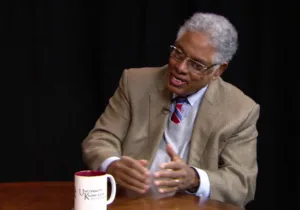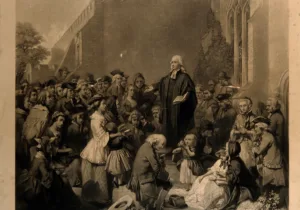Reinhold Niebuhr had a brilliant way of criticizing unrealistic extremes. He once wrote:
“The French Revolution proclaimed ‘liberty, equality, and fraternity’ a little too blithely. For liberty and equality are just as much in contradiction as they are complementary to each other. A society can destroy liberty in its search for equality; it can annul the spirit of equal justice by a too consistent devotion to liberty.”
June Bingham, Courage to Change. (New York and Canada: Charles Scribner’s Sons, 1961), 300.
That wisdom consolidates a lot of punch against the extremes of Marxism and laissez-faire capitalism. Economically, we should have an economy that is free and fair, not fixed as in Socialism. From a Christian viewpoint, however, there are real concerns about economic fairness and justice. Yet, even after decades of pondering these issues, I still have lingering questions.
First, let me wind back time to offer an illustrative point. My first job back in the late 1980s was selling concessions at a movie theater. I am all about fairness and justness, but it would be absurd to argue that my first job should have commanded a living wage. Yes, there is a real need for jobs that enable human flourishing, but I cannot imagine that the simple skills of a high school student could have gotten me through life. Most of us, reflecting on the jobs we once held, realize that those were jobs we cannot imagine keeping forever. They are transitional, stepping-stone jobs, as we get from one place to another. Adam Smith also shared a real concern, however, that there should be living wage jobs. In Wealth of Nations, he wrote:
“A man must always live by his work, and his wages must at least be sufficient to maintain him. They must even upon most occasions be somewhat more; otherwise, it would be impossible for him to bring up a family, and the race of such workmen could not last beyond the first generation.”
Adam Smith, The Wealth of Nations, edited Edwin Cannan (Chicago, University of Chicago Press, 1976), Volume I, 76-77.
Furthermore, he added:
“Thus far at least seems certain, that in order to bring up a family, the labor of the husband and wife together must, even in the lowest species of common labor, be able to earn something more than what is precisely necessary for their own maintenance; but in what proportion, whether in the above-mentioned, or in any other, I shall not take upon me to determine.”
Ibid.
Smith is right, but when I first read the last line, I thought it seemed like the great copout. Then, as I reflected on my own job experience, I realized what a hard question Smith was trying to answer. We do need an economy that is both free and fair, and we do need living wage jobs for all hardworking adults. But that every such job generated by a free market should command a living wage, is one I still wrestle with. A sound economy should generate enough living wage jobs for its workers to seem fair. Is the “invisible hand” of the market, which Smith only briefly referred to, sufficient to provide this? In Smith’s view, the overall skill and pay of any growing free economy should steadily rise.
Thinking over Niebuhr’s quote tells us clearly why we should choose a free market over a Marxist one. It is indeed true that too consistent a devotion to equality will destroy any freedom in an economy, any incentive to rise above the lowest skilled job. On the opposite extreme, an economy left completely to its own devices would be vulnerable to the twin powers of sinfulness (in this case greed) and power. Successful businesses, run by greedy businessmen, would quash competition, and grind their labor force mercilessly into the ground. It was done in Marx’s day, and much before him Adam Smith told us to be wary of the “narrow view” merchants, who lobbied only for their self-interest, and against public welfare. Though Smith advocated for freedom, he understood something about selfish human nature too. We forget that Smith was first a moral theorist, having written the Theory of Moral Sentiments long before he wrote The Wealth of Nations.
Of course, our capitalist market has never really been completely laissez-faire, nor should it be. A fixed, state-run economy, however, tries to do what should never be done: make government do the same job of business instead of regulating its behavior. The first mistake here is an obvious conflict of interest, and an abusive consolidation of powers: productive and regulatory. In the second place, it fails to appreciate the necessary mental differences of businessmen and politicians: the one to make profit, the other to govern and enforce laws.
Certainly, I agree with Niebuhr and share his Christian concerns about a free market. Free markets are just that – free – and we cannot expect perfect freedom to produce perfect fairness. As a young minister, Niebuhr wrote Notebook of a Tamed Cynic revealing his concern:
“According to the ethics of our modern industrialism men over fifty, without special training, are so much junk.” He added further “A city which is built around a productive process, and which give only casual thought and incidental attention to its human problems is really a kind of hell. Thousands in this town are really living in torment while the rest of us eat, drink, and make merry. What a civilization!”
Reinhold Niebuhr, Leaves from the Notebook of a Tamed Cynic, (Westminster John Knox Press, Louisville, 1957), 115.
Niebuhr first demonstrated the compassion of a Christian and later acquired the realist wisdom that the Marxist solution to this Christian concern was ultimately wrong.
And what is our solution? A free market will never be a completely fair market, and that is a compromise with which we must be willing to accept in order to avoid the Marxist error. Free markets allow selfish and powerful individuals to accrue more power than they already have, while workers at a disadvantage may fall behind. Without a doubt we must pay close attention to the fairness and equity of the market, we must never turn a blind eye to it. Yet we must always be cognizant that overextended governmental power is very likely to be as dangerous as too wide a latitude for the power of free business. Balance of economic power against political power seems to be the key, just as we weigh the scales of liberty and equality. We need both. If we were to be robbed of either, wouldn’t we want the other? If I have no freedom, I will crave it. If I have no feeling of relative equality with fellow citizens, I shall desire that also. Balancing the scales of liberty and equality is not just a free-market concern, but a Christian and human one too.







 Live in the DC area? Sign-up for Providence's in-person events list!
Live in the DC area? Sign-up for Providence's in-person events list!